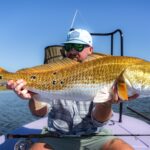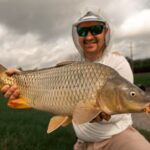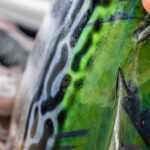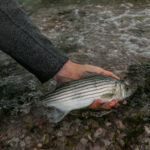
Louisiana Bull Reds Up for Harvest Again: H.B. 604 Must Not Pass
Photo Credit: Carter Abramson | Trevor Johnson Every now and then, we encounter something so
The never-ending saga of a little oily fish in the Chesapeake had the next chapter written last week. Omega Protein sent out a press release on September 12th that had many of us stunned. No matter which way you slice it, they decided to ignore the Bay Cap assigned by the Atlantic States Marine Fisheries Commission.
Atlantic menhaden are currently managed under Amendment 3 to the Interstate Fishery Management Plan (FMP) for Atlantic Menhaden. The Bay Cap is the maximum limit of menhaden allowed to be caught within the Chesapeake Bay. It was originally set at over 87k metric tons. The commissioners at ASMFC lowered the Bay Cap to 51k metric tons in November of 2017. This was done to protect the environmental integrity of the Chesapeake. Omega seems to disagree.
Metric tons are a tricky variable to extrapolate. The total catch is set at 216,000 mt. Omega has a little under 80% of that coastal quota. That translates to about 350 million pounds of menhaden. The menhaden caught in the bay are smaller than the ones caught in the ocean. 51k mt is somewhere around 110 million pounds of fish that don’t average a lb. That’s an awful lot of filter feeding not taking place. That is an awful lot of fish, birds, and marine mammals wondering where their next menhaden dinner is coming from. That’s also happening every single year.
ASMFC got the 51k mt number by averaging the harvest inside the Chesapeake over the course of a five years. The Bay Cap doesn’t really hurt Omega. This year, Omega felt differently. “..the Company will exceed the ASMFC’s arbitrarily low and unscientific cap recommendation on harvest in the Bay for the 2019 season.” Here we are again; the next chapter is being written.
You can’t really understand what Omega does to the Chesapeake unless you live here. First, there’s a history of clean water violations. Most violations are from discharging “bail water”. That is all the fish waste that accumulates in the holds. They aren’t supposed to discharge it within three miles of the Chesapeake. But, they paid a 7.5 million dollar fine for being caught doing it in 2013.
There was also the six times in eight years that Omega Protein was cited for pollution problems including letting toxic ammonia escape the plant and contaminate a creek that feeds the bay. That led to an upgrade to the plant that had a 20-million-dollar price tag.
There are also the conflicts with the charter fleet as well as recreational anglers. Things are changing quite a bit in the Chesapeake. In the last twenty years, we have gone from catching stripers, weakfish, and bluefish to a more consistent bite on cobia and bull red drum. As these changes unfold, the interactions with Omega boats has increased dramatically.
The captains and rec anglers are essentially sight fishing for cobia and red drum that are concentrating on schools of menhaden. I’m sure you can imagine what happens to the fishing when the Omega boats appear on the horizon. If you don’t believe me, please look on the social media pages of these captains. Things are starting to get heated.
To rub some salt on the wound, Omega Protein is no longer a Texas-based company. Cooke aquaculture, a Canadian-based company purchased Omega recently. If you are familiar with Cooke Aquaculture, then you already know about their violations. If you don’t, there’s more than a few.
If you haven’t heard about aquaculture salmon (a component of Cooke Aquaculture’s overall harvest), you should probably read about it. First, these operations are accelerators for diseases. Second, aquaculture fish are not nearly as healthy to eat as wild fish. Here’s a video that shows firsthand what we are saying. As per the video, Piscine Reovirus is rampant in aquaculture and has been spread to wild populations from aquaculture operations. Please, don’t let anyone tell you that this virus already exists in the wild. “Although PRV is in the natural environment, what we are now making our decision on is that PRV is not widely distributed in the wild. We sampled thousands of Chinook in the wild and we see an incidence of seven per cent or less, so the notion that PRV is natural and everywhere is not true. The incidence in the farmed fish we sampled was 75 to 80 per cent.” We aren’t against aquaculture; our country needs the food. But, turning pristine areas into concentrated animal feed lots on the water is unacceptable. Any of you trout fishermen recall whirling disease? How about chronic wasting disease that was spread by farmed deer? Closed system, land-based aquaculture is a much more friendly solution. That said, wild fish are still the best.
Omega also has a robust operation in the Gulf of Mexico. Here’s a brief rundown of the various violations in the Gulf fishery. The Gulf harvest of menhaden dwarfs the Atlantic harvest. That’s three coasts where their impacts are being felt.
Since Omega operates as the only reduction fishery in the Atlantic and the Gulf of Mexico, they are protected under The Magnuson-Stevens Act by “The Rule of Three”. “If there are less than three entities operating in any fishery at a local, state, or regional level, those data derived from those entities must be included in aggregate at a level that will not compromise individual confidentiality. In other words, if one state has confidential landings, it must be combined with the whole region to prevent disclosure.” In layman’s terms, reporting is essentially confidential by law.
I’ve set you up for the most unbelievable facet of Omega Protein. All marine fisheries in Virginia are managed by VMRC (Virginia Marine Resources Commission). Well, all of them except one. You guessed it! Omega protein is managed by the Virginia legislature. Because, it makes perfect sense for elected officials to manage a fishery that removes hundreds of millions of the most important fish in the sea per year.
Here’s the knockout punch. The menhaden reduction fishery was just given a “sustainable” label by the Marine Stewardship Council on September 3rd, 2019. That’s right folks, all of this is “sustainable”. Makes you want to scream doesn’t it? MSC was started for good reasons. We are sure of that. This move makes you wonder if their process is flawed. If anyone from MSC is reading this, your credibility took a big hit with this certification.
We have covered an awful lot so far. Here’s the Reader’s Digest version of the story. A foreign company has committed multiple violations on three coasts, catches and melts down the most important fish in the sea, feeds it to diseased feed lot salmon, which in turn are fed to people, ignores the rules set up by the management body that governs menhaden harvest for the Atlantic Coast, and goes out of compliance two weeks after they are certified sustainable. You can’t make this stuff up.
We are trying to figure out a way forward. The benchmark stock assessment for menhaden should be out the end of 2019. With that, there could some movement in managing menhaden with Ecological Based Reference Points rather than a single species. This process is ongoing and we have some concerns already. Will it address the FACT that you can’t catch 110+ million filter feeding forage fish from the nation’s largest estuary every year and think everything is OK? We aren’t holding our breath.
Stay tuned for Part II in this series which will cover the reasons why ASMFC is hesitant to find Omega Protein out of compliance.

Photo Credit: Carter Abramson | Trevor Johnson Every now and then, we encounter something so

This past weekend, ASGA proudly sponsored the Dirty Carp Tournament in Louisiana — and no, you didn’t misread that.

After years of data pouring in from The Albie Project, advocacy, persistence, and support from

This morning, the Connecticut Environment Committee held a hearing on House Bill 6248, a bill
We rely on our members and donations to keep fighting for a sustainable tomorrow in marine conservation.
GIVE THE GIFT OF FISHERIES CONSERVATION THIS HOLIDAY SEASON. SHOP ASGA GOODS THAT FUND FISHERIES RESEARCH & ADVOCACY CAMPAIGNS
JOIN ASGA IN CALLING FOR CRITICAL MANAGEMENT ACTION AFTER YEARS OF SPAWN FAILURES & POOR MANAGEMENT.
By using this website, you agree to our use of cookies. We use cookies to provide you with a great experience and to help our website run effectively. To learn more, please review our privacy policy.
9 Responses
As long as this fishery remains political, they will net them to Extinction
This article is infuriating. It so sad to see that our goverment is for sale and big companies are permitted to completely disregard laws with no consequences. Everyone should be outraged by this article and folks that are allowing this to happen should be embarrased. Something needs to be done or these clowns are going to ruin this fishery, and every other fishery that depends on them.
Omega, please list out one or two positive effects on the Chesapeake’s overall health (including dependent non human species) that are a direct result of removing 80% of the 1-3 year-old menhaden from the estuary annually.
Why is there no call to action at the end of this article? Why isn’t there a petition to sign against this company? Can somebody please start one?? Why do we sit with this information with no action….?
We are working on a best course of action. It has been a back and forth with Omega for decades. Your frustration is shared, believe us.
The reason there is no call to action is due to the fact petitions have been signed. We have asked and pleaded for action, and yet the government specifically the virginia assembly ignores us. The fat cats dont want to give up the extra income. Truly a sad story
This is the part that really bothers me: If you or I wanted to go into a State forest and start a logging operation and sold the lumber to a foreign country, we’d be put under the jail. That resource belongs to all of us. What is the difference between that resource and the menhaden that our state is allowing to be taken and sold out of country? Can you say $$$$$? And where does that money go? In to our politicians pocket? I haven’t heard any mention that it goes into education funds. And how about the high fines they are paying to keep up thier illegal practice? Where does that money go?
This may be a only venue we as state citizens have available to us to try to get this practice stopped. We are the only state on the East Coast that allows this to take place, and I think it time to stop it
I have been fishing the lower bay out of Hampton since 1956 and the fishing has been the worst in the past four years. We do not have the menhaden bait fish to sustain the fishing species or animals and birds that depend on the menhaden. When will our crooked Virginia politicians wake up and put our bay above their own interests. Bill Harris